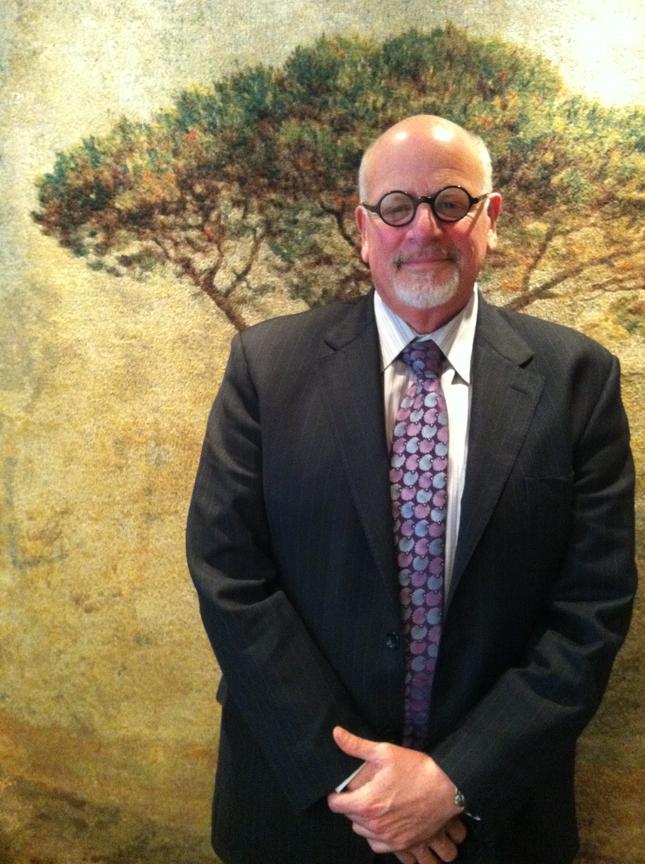Dr. Richard Goldberg is a 21st Century Renaissance Man. The Georgetown University Hospital President explores next-generation technology and psychiatry by day, rides motorbikes on his vacations, and reads the classics for fun. At RIS last week, he shared insights that he has gained during 42 years at Georgetown.
From Psychiatrist to President
When asked about his career path, going from mind doctor to hospital president, he gave a sigh of appreciation. “It’s an interesting journey because psychiatry is frequently at the bottom of the food chain,” he said.
His choice of a psychosomatic specialty brought him to other hospital physicians and their patients, aiding a progression from resident to faculty member to department chair. And in the financially challenging times of late 1990s he became (simultaneously and for the same salary) dean of clinical affairs, dean of graduate medical education, chair of psychiatry, and president of the 450-doctor faculty practice group, the last that lay the groundwork for promotion.
His practice area may not have the reputation as a hospital power broker, but it often confers leadership ability. “As a psychiatrist—as long as you don’t behave like a psychiatrist—you have a certain degree of emotional intelligence about people and how they best work together…It’s very helpful in managing a hospital, managing a physician, managing people.”
In 2000, Medstar bought the Georgetown University Hospital and faculty practice, and Goldberg began overseeing hospital quality and safety as vice president of medical affairs, a position he jokingly compares with serving as an assistant principal in a high school with wayward physicians. He’s held the hospital presidency for two years.
Over the last decade the hospital has changed deficits into surpluses, gained leverage with equipment suppliers through Medstar, and earned the number 3 ranking among the 57 DC Metropolitan hospitals, as well as the only “Magnet” status (for nursing excellence).
Goldberg’s DC life is a far cry from his childhood along the New York shore. The Long Beach resident played basketball and baseball with Billy Crystal (who showed Oscar promise even as high school variety show MC) and frolicked by the bay, but according to him the island life was insular. “I thought everyone was from Brooklyn. It turns out that’s not the case.”
Along with his worldview, this city and hospital have transformed over several decades. Visiting DC in the 1950s, he admits being shocked by the Washington Monument’s separate restrooms and water fountains for blacks and whites. Georgetown Medical School in the late 1960s was likewise wholly different from today: 98 men were paired with two women per class, there were no CAT scans and head scans, doctors mixed their own IVs, and psychiatry focused on psychotherapy. He relishes many of the changes, describing 50/50 student ratio as “humanizing” and new technology and drugs as “outstanding” in their potential impact.
The Future of Health Care
Goldberg believes computers will shape our future through nanotechnology, robotics and genetics, trends emerging in medicine. In a new era of personalized medicine, he explains, doctors will use genetics to identify the likelihood of developing a disease and the best medications for an individual. It will be possible to inject patients with nanorobot sensors, which will float around the blood system and organs, giving feedback to detection devices to indicate if an illness has occurred or tell about a treatment’s progression.
Robots like the da Vinci Surgical System will allow doctors to operate easily and intuitively for prostrate and thoracic cancer, and other ailments treated at the Lombardi Cancer Center.
Viruses packed with chemotherapy will use receptors to find and join cancer cells and release the chemotherapy while sparing normal tissue, increasing the survivability for a broad range of cancer disorders.
Yet there is a huge paradox in health care. The underserved population and Jesuit traditions contrast with a depersonalized and potentially costly high-tech future.
The hospital relies on its heritage for guidance. While Jesuits, a Catholic order that stresses lifelong education, are less visible than in the past, they guided the mission adopted in 2007. “Cura personalis” (meaning care of the whole person) is a reminder that pills and technology must serve the broader goal of satisfying emotional, spiritual and physical needs.
The giving nature of the order also prompts charity care for the poor. A children’s van goes out to the most underserved areas of Washington DC, treating kids who wouldn’t ordinarily get medical care, and the hospital offers free cancer screenings to adults.
Goldberg sees many gaps in the health care system but says he is optimistic that a country as great as ours can meet them.
“We need to have more accessible care for individuals,” he says. “We need to cover more individuals. We need to have more emphasis on wellness than sickness.
“We need to be more aware of care as not just a single episode, but a continuity of care. We need to be safer and higher quality in terms of or care.”
But as with most things, he understands that progress will be incremental. “I don’t think can be created de novo out of somebody’s head. It has to, like any good system, evolve.”
From Motorcycles to Mahatma Gandhi
One way he deals with work pressure is to exit his element. For 25 years—starting with a Harley Sportster, now on a BMW 3 Touring Bike—he has cycled the country. His fascination with human narrative is given broader play, meeting people like those recently out of prison that would otherwise be unlikely confidantes. He also enjoys communing with the environment, whether the national parks of the Southwest or the seascape of Key West.
“There’s something about being on a motorcycle that is relaxed concentration,” he says. “You have to concentrate all the time, but you’re in this zone, you’re participating with the road and nature rather than observing it.”
If motorcycling is a social and spiritual quest, his literary projects are an intellectual journey. His free time is not occupied by friends, restaurants and movies. Rather, he has taken on a sort of literary project. He reads classics and listens to biographies (currently Mahatma Gandhi’s autobiography) while he exercises on his Octane seated elliptical machine. The biographies have provided personal instruction, including two major life lessons.
“Every person no matter how successful or how much we idealize them has incredible unevenness. They can have great contributions in some areas and weaknesses in other areas,” he says.
“And they have been down and out at various times in their life,” he adds. “The path to greatness is not a straight line. Its really enduring and learning how to get out of those troughs in your life, whatever they are.”
“Aging well is about being adaptable, learning how to find meaning in activities that you might not have been interested in before, but that you can now do.”
He summarizes with a common phrase given deeper resonance by his inspiring example in psychiatry, literature, and leadership. “That’s what life is about – meaning.”
To Listen to interview, click here


